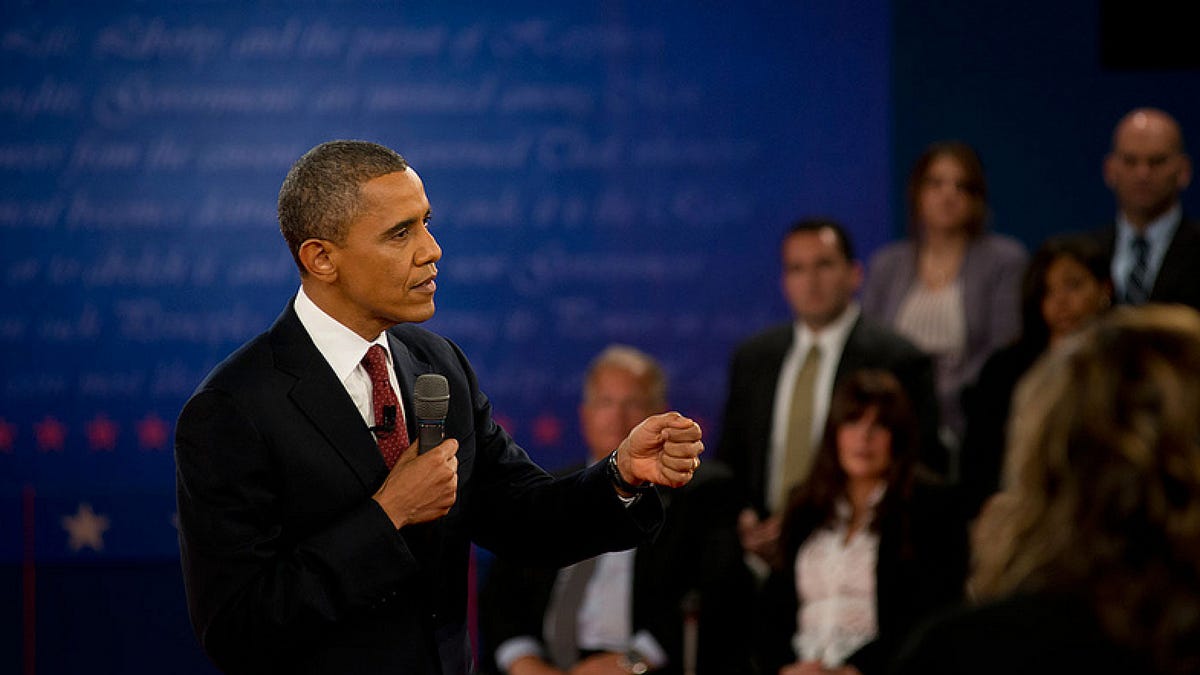Obama faces piracy, privacy tests in his second term
It's difficult to predict what technology topics will confront the president over the next four years, but Internet surveillance and a successor to the Stop Online Piracy Act are likely on the menu.

The most controversial technology topics in President Obama's second term are likely to be two political flashpoints: piracy and privacy.
When Internet activists allied with an hastily assembled coalition of Silicon Valley companies blocked votes on a pair of Hollywood-backed copyright bills early this year, they didn't end efforts to slap stiffer anti-piracy sanctions on the Internet. They merely postponed the fight.
The Stop Online Piracy Act and the Protect IP Act are dead, of course. Those names have become radioactive on Capitol Hill, thanks to a broad public outcry that involved millions of Internet users and actually managed to knock some Senate Web sites offline. It was helped along by alerts on the home pages of Google, Craigslist, Wikipedia, and many other sites.
But months later, after the furor had died down, the White House quietly published a report calling for new "legislative" tools in the same vein as SOPA and Protect IP. It reiterated that "combating online infringement" is a government priority "of the highest order."
In an op-ed last month, Chris Dodd, a former Democratic senator who's now the chairman of the Motion Picture Association of America, said he doesn't want to fight last winter's battles all over again. But, Dodd added, "intellectual property protection is important and needs to be discussed."
Dodd had said in the spring that he was "confident" Obama was using his "good relationships in both communities" -- that is, Silicon Valley and Hollywood -- to advance a successor to SOPA. And last night, in a statement congratulating the president on his re-election, Dodd said Hollywood looks forward to working with the new administration to protect "creative industries" that rely on strong copyright protection.
Cary Sherman, chairman of the Recording Industry Association of America, sounded a similar note when he testified (PDF) before a House committee in June. Although cooperation with tech firms is happening, Sherman said, "sometimes the Congress must step in to assure that our property rights, and U.S. economic interests, are being protected -- especially against sites overseas whose business model is the theft of U.S. work."
Obama's political challenge is that Southern California remains a more reliable source of Democratic Party funding and support than Northern California. DreamWorks Animation CEO Jeffrey Katzenberg and Warner Bros. Chairman Barry Meyer were Obama's top "bundlers," raising more than $4 million for his 2012 campaign, and some film and music moguls reportedly threatened to cut off funds if Obama distanced himself from the Hollywood-backed bills. Approximately three-quarters of Protect IP's supporters were Democrats.
Instead of criticizing the bills and saying he opposed them, as his Republican rivals did, Obama tried to finesse his position in a Google+ hangout in January, saying that everyone should "come together and work with us" to enact legislation.
"Candidly, those who count on quote 'Hollywood' for support need to understand that this industry is watching very carefully who's going to stand up for them when their job is at stake," Dodd said on Fox News a few days after the White House raised modest questions about the implications of SOPA and Protect IP.
Refereeing privacy vs. surveillance
The Obama administration also will also be presented with the unenviable task of refereeing a series of disputes between privacy advocates and law enforcement officials who are hoping to expand their Internet surveillance powers.
During his 2008 presidential campaign, Obama pledged to strengthen U.S. privacy laws. He told CNET at the time that: "I will work with leading legislators, privacy advocates, and business leaders to strengthen both voluntary and legally required privacy protections." And his campaign Web site pledged that as president, he would "strengthen privacy protections for the digital age."
Companies, including Amazon.com, AOL, eBay, Google, Microsoft, Intel, and AT&T, the ACLU, and Americans for Tax Reform have been lobbying to update federal privacy law to do just that: require warrants before police can access e-mail or track Americans' cell phone locations.
Those companies and advocacy groups hope to update the 1986 Electronic Communications Privacy Act, or ECPA, which is notoriously convoluted and difficult even for judges to follow. Under ECPA, Internet users enjoy more privacy rights if they store data locally, a legal hiccup that members of the coalition fear could slow the shift to cloud-based services unless it's changed to require police to obtain a search warrant to access private communications.
But the Justice Department has warned that updating that telephone-modem-era law would have an "adverse impact" on investigations. And last month, federal prosecutors told an appeals court that Americans have "no privacy interest" in records revealing their -- or their mobile device's -- location.
The White House has not, at least so far, taken a formal position on updating ECPA to require search warrants for e-mail or geolocation data.
Two more long-simmering privacy disputes that could boil over at any time: the Justice Department has asked Congress to enact laws that would require Internet service providers to keep track of what their customers are doing, and, as CNET reported in May, the FBI has drafted legislation that would require firms, including Microsoft, Facebook, Yahoo, and Google to build in backdoors for government surveillance.

